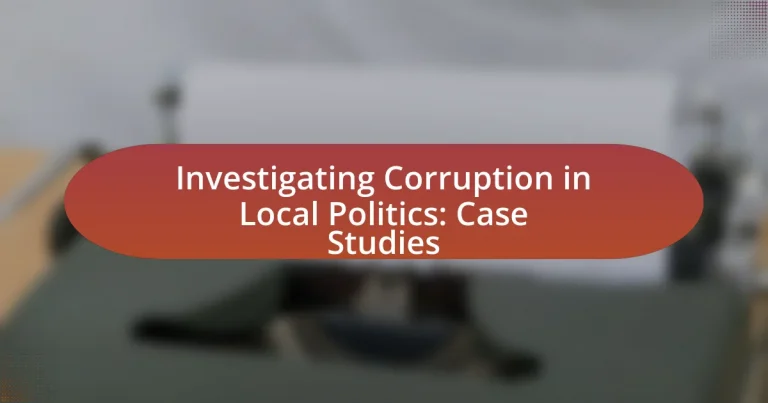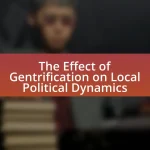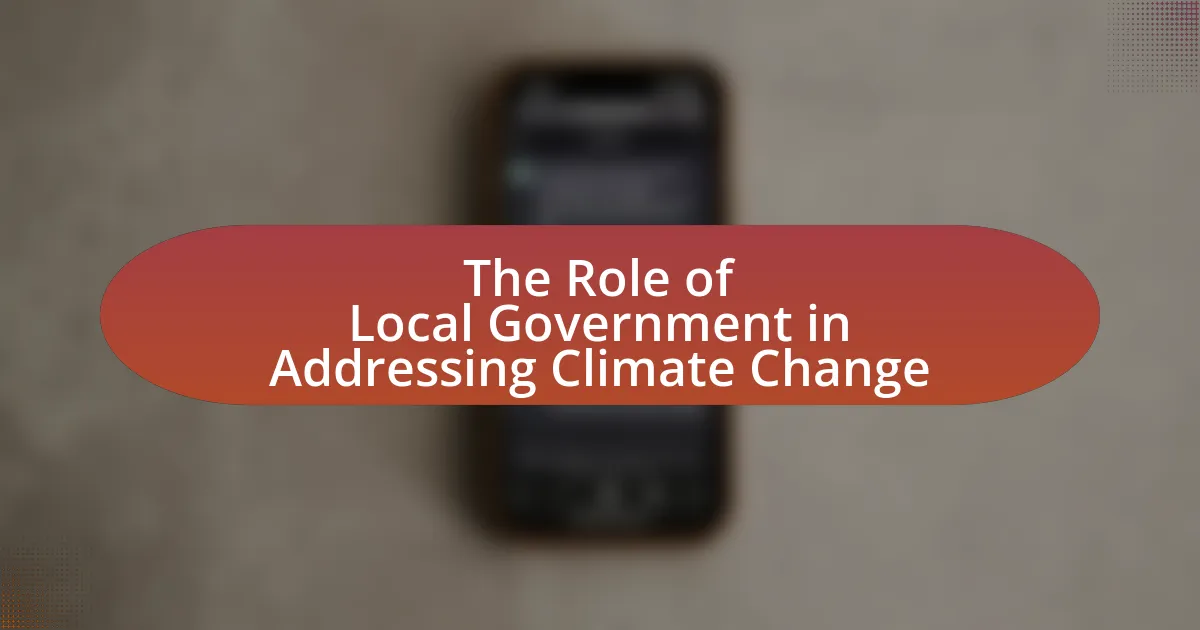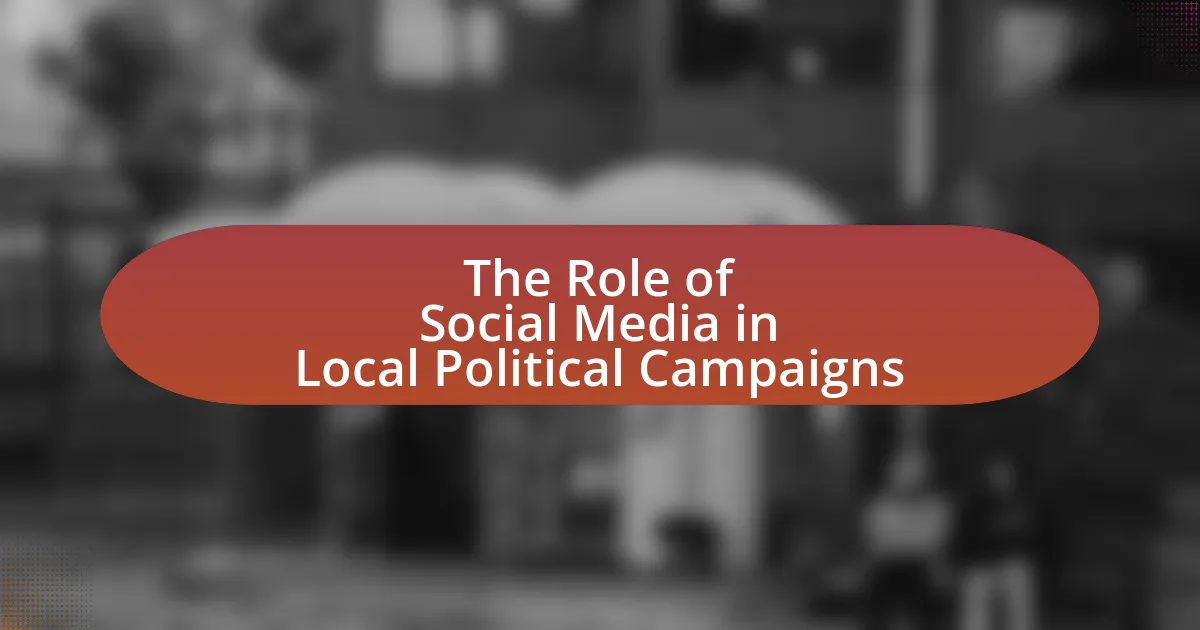Corruption in local politics is defined as the abuse of power by local officials for personal gain, manifesting through practices such as bribery, embezzlement, and nepotism. This article examines the detrimental effects of corruption on community trust, economic development, and governance, supported by case studies that illustrate systemic issues within local political systems. It also discusses methodologies for investigating corruption, the challenges faced by investigators, and best practices for reforming local governance to enhance accountability and transparency. Through a comprehensive analysis, the article highlights the importance of addressing corruption to foster ethical governance and improve public service delivery.
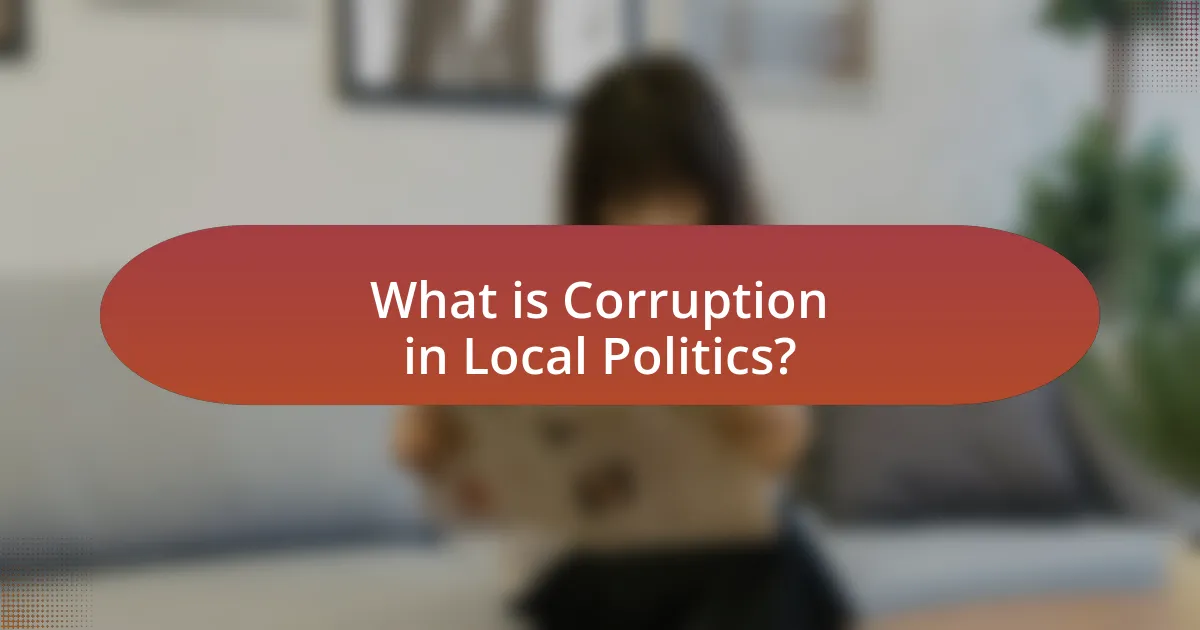
What is Corruption in Local Politics?
Corruption in local politics refers to the abuse of power by local officials for personal gain, undermining public trust and the integrity of governance. This can manifest through bribery, embezzlement, nepotism, and favoritism, where officials prioritize their interests over the community’s needs. For instance, a study by the World Bank indicates that corruption at the local level can significantly hinder economic development and public service delivery, with estimates suggesting that up to 30% of public funds can be lost to corrupt practices.
How is corruption defined in the context of local politics?
Corruption in the context of local politics is defined as the abuse of entrusted power for private gain, which can manifest through bribery, nepotism, embezzlement, and other forms of unethical behavior. This definition is supported by various studies, including the Transparency International Corruption Perceptions Index, which highlights how local officials may exploit their positions to benefit personally at the expense of public resources and trust. Such actions undermine democratic processes and erode community confidence in governance, as evidenced by numerous case studies that illustrate the detrimental effects of corruption on local development and public service delivery.
What are the common forms of corruption found in local governance?
Common forms of corruption found in local governance include bribery, nepotism, embezzlement, and fraud. Bribery occurs when officials accept payments to influence decisions, undermining fair governance. Nepotism involves favoring relatives or friends in hiring or contract awards, which can lead to inefficiency and lack of accountability. Embezzlement refers to the misappropriation of funds entrusted to an official’s care, often resulting in significant financial losses for local governments. Fraud encompasses various deceptive practices aimed at securing unfair or unlawful gain, such as falsifying documents or misrepresenting information. These forms of corruption can severely impact public trust and the effective functioning of local governments.
How does corruption manifest in local political systems?
Corruption manifests in local political systems through bribery, nepotism, embezzlement, and the manipulation of public resources. Local officials may accept bribes to award contracts or permits, undermining fair competition and transparency. Nepotism occurs when officials favor relatives or friends in hiring or contracting, leading to inefficiency and a lack of accountability. Embezzlement involves the misappropriation of public funds for personal gain, which can severely impact community services. Additionally, the manipulation of public resources often results in the diversion of funds from essential services to private interests, eroding public trust. According to Transparency International’s Corruption Perceptions Index, many local governments in developing countries exhibit high levels of perceived corruption, indicating systemic issues that hinder effective governance.
Why is investigating corruption in local politics important?
Investigating corruption in local politics is important because it ensures accountability and transparency in governance. Corruption at the local level can undermine public trust, distort resource allocation, and hinder community development. For instance, a study by the World Bank found that corruption can reduce economic growth by up to 1.5% annually in developing countries, highlighting the significant impact of corrupt practices on local economies. By uncovering corrupt activities, authorities can implement reforms that promote ethical governance and improve public services, ultimately benefiting the community as a whole.
What impact does corruption have on community trust and governance?
Corruption significantly undermines community trust and governance by eroding the legitimacy of institutions and fostering a culture of cynicism among citizens. When public officials engage in corrupt practices, such as bribery or embezzlement, it leads to a perception that government actions are driven by self-interest rather than the public good. This perception diminishes citizens’ willingness to engage with governmental processes, as evidenced by a 2019 study published in the Journal of Politics, which found that communities with higher corruption levels reported lower trust in local government and decreased civic participation. Consequently, weakened trust in governance can result in reduced compliance with laws and regulations, further perpetuating a cycle of corruption and disengagement.
How does corruption affect local economic development?
Corruption negatively impacts local economic development by diverting public resources, increasing costs for businesses, and undermining trust in institutions. When local officials engage in corrupt practices, funds intended for infrastructure, education, and public services are misappropriated, leading to inadequate facilities and services that stifle economic growth. For instance, a study by the World Bank found that corruption can reduce a country’s economic growth rate by up to 1.5% annually, as it creates an environment where businesses face higher operational costs due to bribery and inefficiencies. Additionally, corruption erodes public trust, discouraging investment and participation in the local economy, which further hampers development efforts.
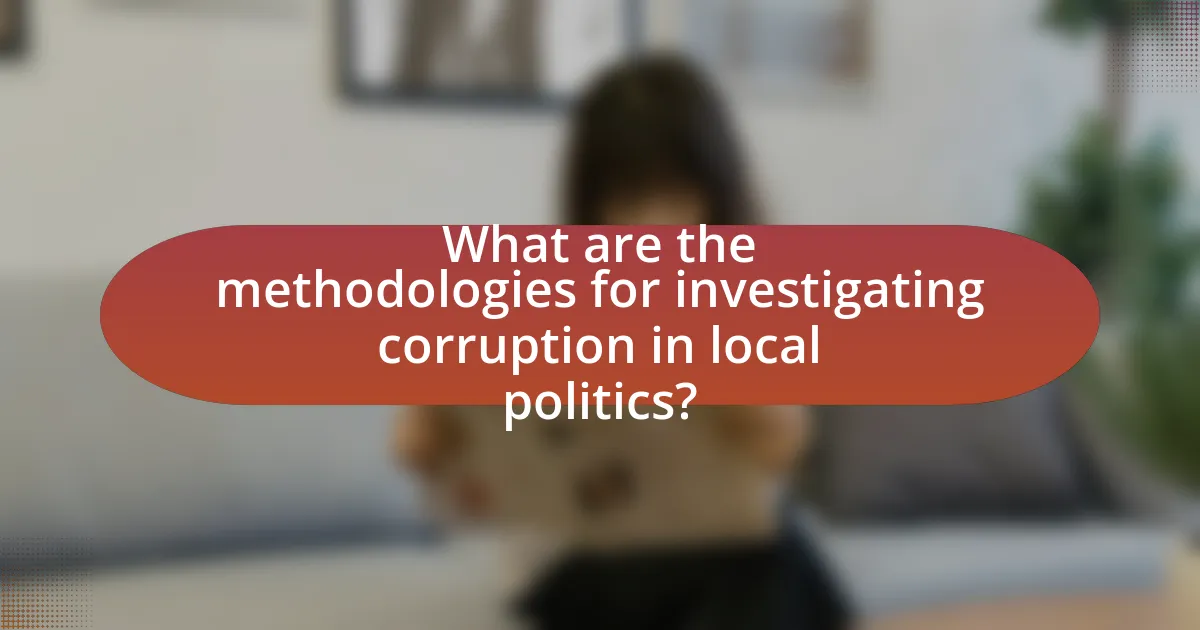
What are the methodologies for investigating corruption in local politics?
The methodologies for investigating corruption in local politics include qualitative research, quantitative analysis, case studies, and mixed-method approaches. Qualitative research often involves interviews and focus groups with stakeholders, allowing for in-depth understanding of local political dynamics and corruption perceptions. Quantitative analysis utilizes statistical methods to examine patterns and correlations in data, such as financial records or voting behavior, to identify anomalies indicative of corruption. Case studies provide detailed examinations of specific instances of corruption, offering insights into the mechanisms and consequences of corrupt practices. Mixed-method approaches combine both qualitative and quantitative techniques, enhancing the robustness of findings. These methodologies are supported by various academic studies, such as the work by Transparency International, which emphasizes the importance of comprehensive approaches in understanding and addressing corruption at the local level.
What research methods are commonly used in corruption investigations?
Corruption investigations commonly utilize qualitative and quantitative research methods. Qualitative methods include interviews, focus groups, and case studies, which provide in-depth insights into the behaviors and motivations of individuals involved in corrupt practices. Quantitative methods involve statistical analysis of data, such as financial records and public procurement documents, to identify patterns and anomalies indicative of corruption. For instance, the use of regression analysis can reveal correlations between political contributions and contract awards, highlighting potential corrupt relationships. These methods are supported by various studies, such as the World Bank’s “Combating Corruption in Public Procurement” report, which emphasizes the importance of both qualitative and quantitative approaches in effectively identifying and addressing corruption.
How do qualitative and quantitative methods differ in this context?
Qualitative and quantitative methods differ significantly in investigating corruption in local politics. Qualitative methods focus on understanding the underlying motivations, perceptions, and experiences of individuals involved in corruption, often utilizing interviews, focus groups, and case studies to gather in-depth insights. In contrast, quantitative methods emphasize numerical data and statistical analysis to identify patterns and correlations, typically employing surveys and existing data sets to measure the prevalence and impact of corruption. For example, qualitative research might reveal the personal stories behind corrupt practices, while quantitative research could provide statistical evidence of corruption rates across different localities, thereby illustrating the broader scope of the issue.
What role do case studies play in understanding local political corruption?
Case studies play a critical role in understanding local political corruption by providing detailed, context-specific insights into the mechanisms and impacts of corrupt practices. They allow researchers and policymakers to analyze real-world examples, revealing patterns of behavior, systemic vulnerabilities, and the socio-political dynamics that facilitate corruption. For instance, the case study of the 2014 scandal in the city of Bell, California, highlighted how local officials exploited their positions for personal gain, leading to significant reforms in governance and accountability measures. Such concrete examples illustrate the complexities of corruption and inform strategies for prevention and intervention.
What challenges do investigators face when probing local political corruption?
Investigators face significant challenges when probing local political corruption, primarily due to a lack of resources and political resistance. Limited funding and manpower hinder thorough investigations, making it difficult to gather sufficient evidence. Additionally, local political figures often wield considerable influence, which can lead to intimidation or obstruction of justice, as seen in various cases where whistleblowers faced retaliation. Furthermore, the complexity of corrupt schemes can obscure accountability, complicating the investigative process. These factors collectively create an environment where uncovering corruption becomes increasingly difficult, as evidenced by numerous studies highlighting the prevalence of such obstacles in local governance.
How do political influences obstruct corruption investigations?
Political influences obstruct corruption investigations by creating an environment where accountability is undermined and investigative processes are hindered. Politicians may exert pressure on law enforcement agencies, manipulate legal frameworks, or use their influence to intimidate whistleblowers, thereby stifling evidence collection and testimony. For instance, in various cases, such as the 2015 corruption scandal in Brazil involving Petrobras, political leaders were implicated, leading to significant interference in investigations as they sought to protect their interests and those of their allies. This manipulation of power dynamics results in a lack of transparency and impedes the pursuit of justice, ultimately allowing corruption to persist unchecked.
What legal barriers exist in the investigation of local corruption?
Legal barriers in the investigation of local corruption include limitations on access to public records, lack of whistleblower protections, and jurisdictional challenges. Access to public records can be restricted by laws that allow officials to withhold information, making it difficult for investigators to gather evidence. Additionally, the absence of robust whistleblower protections discourages individuals from reporting corrupt activities due to fear of retaliation. Jurisdictional challenges arise when local authorities may not have the legal authority to investigate or prosecute corruption that crosses municipal boundaries, complicating enforcement efforts. These barriers hinder effective investigations and accountability in local governance.
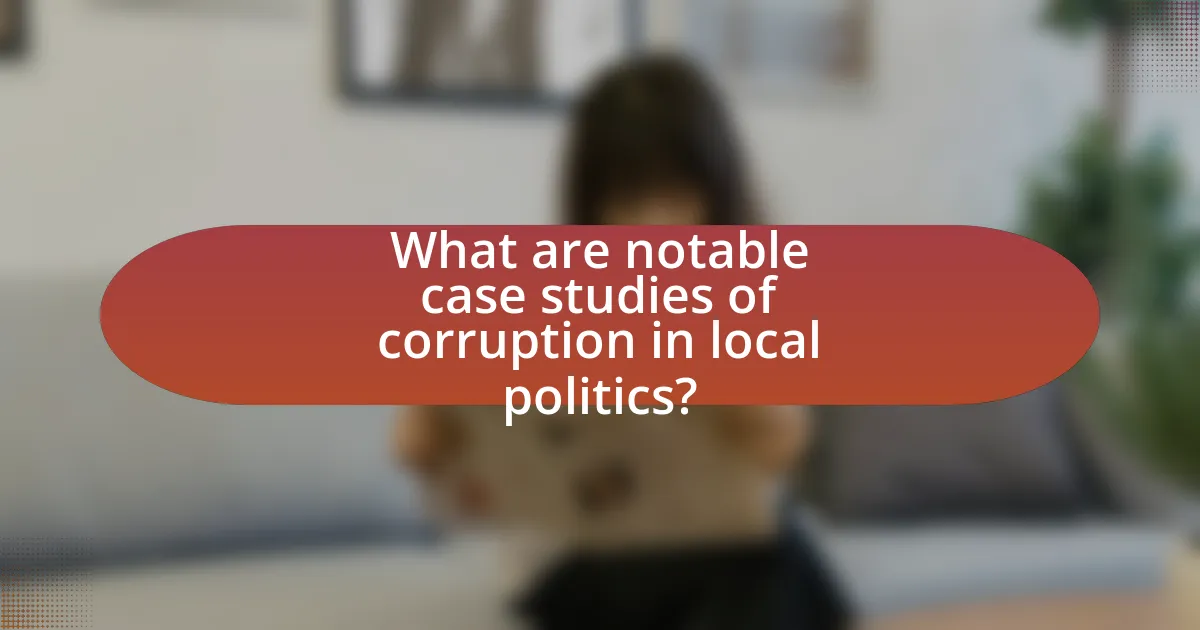
What are notable case studies of corruption in local politics?
Notable case studies of corruption in local politics include the 2014 Chicago City Hall corruption scandal, where several officials were indicted for bribery and fraud related to city contracts. This case highlighted systemic issues in the allocation of public resources and led to significant reforms in procurement processes. Another example is the 2016 corruption case in the city of Bell, California, where city officials were found to have inflated their salaries and misused public funds, resulting in criminal charges and a public outcry that prompted statewide reforms in municipal governance. These cases illustrate the pervasive nature of corruption in local governance and the impact on public trust and accountability.
What are some significant examples of corruption in local governance?
Significant examples of corruption in local governance include the 2014 Detroit bankruptcy, where city officials were accused of mismanagement and corruption leading to a $18 billion debt. Another example is the 2015 scandal in the city of Baltimore, where officials were implicated in a bribery scheme involving city contracts. Additionally, the 2016 case in the city of Chicago highlighted corruption in the awarding of city contracts, resulting in multiple arrests of local officials. These instances demonstrate systemic issues within local governance that can lead to significant financial and ethical breaches.
How did the case of [specific case] unfold and what were the outcomes?
It is not possible to answer the question as it lacks a specific case reference. Without identifying the particular case, I cannot provide details on how it unfolded or its outcomes.
What lessons were learned from the [specific case] investigation?
It is not possible to provide an answer to the question regarding the lessons learned from the specific case investigation without knowing the details of the specific case being referenced. Each case investigation yields unique insights based on its context, findings, and outcomes.
How do these case studies inform future investigations?
Case studies inform future investigations by providing empirical evidence and insights into the mechanisms of corruption within local politics. They highlight patterns of behavior, systemic vulnerabilities, and the effectiveness of various investigative techniques. For instance, the examination of specific cases reveals how corrupt practices are often interconnected with political structures, enabling investigators to identify red flags and prioritize areas for scrutiny. Additionally, these studies can demonstrate the impact of legal frameworks and enforcement strategies, guiding future policy recommendations and investigative approaches. By analyzing outcomes and methodologies from past cases, future investigations can be better equipped to address similar challenges and enhance accountability in local governance.
What best practices can be derived from successful corruption investigations?
Best practices derived from successful corruption investigations include establishing a clear legal framework, ensuring independence of investigative bodies, and fostering collaboration among agencies. A clear legal framework provides guidelines for investigations, as seen in countries like Singapore, where strict anti-corruption laws have led to significant reductions in corruption levels. Independence of investigative bodies, exemplified by the establishment of the Independent Commission Against Corruption in Hong Kong, allows for unbiased investigations free from political influence. Collaboration among agencies enhances resource sharing and expertise, as demonstrated in the United States through task forces that combine federal, state, and local resources to tackle corruption effectively. These practices contribute to more effective and credible investigations, ultimately leading to greater accountability in local politics.
How can local governments implement reforms based on these case studies?
Local governments can implement reforms based on case studies by analyzing successful strategies used in similar contexts and adapting them to their specific needs. For instance, case studies often highlight the importance of transparency measures, such as public access to government spending data, which can reduce opportunities for corruption. Evidence from various municipalities shows that implementing open data initiatives led to a 30% decrease in reported corruption cases. Additionally, local governments can establish independent oversight bodies, as demonstrated in case studies where such entities effectively monitored public contracts, resulting in improved accountability and reduced fraud. By leveraging these proven approaches, local governments can create tailored reform strategies that address their unique challenges in combating corruption.
What practical steps can communities take to combat local political corruption?
Communities can combat local political corruption by implementing transparency measures, such as public access to government records and decision-making processes. For instance, establishing open data platforms allows citizens to scrutinize budgets and expenditures, which has been shown to reduce corruption in various municipalities. Additionally, communities can promote civic engagement through regular town hall meetings, enabling residents to voice concerns and hold officials accountable. Research indicates that increased public participation correlates with lower corruption levels, as seen in the case of Porto Alegre, Brazil, where participatory budgeting significantly improved accountability. Furthermore, communities can support anti-corruption organizations that provide resources and training to local leaders, fostering a culture of integrity and ethical governance.
